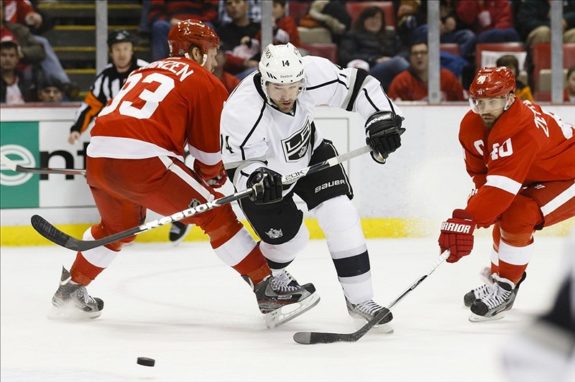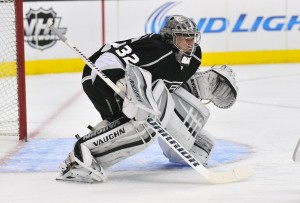There are three kinds of lies: lies, damned lies, and statistics — Mark Twain
When you’re the defending Stanley Cup champs and it’s early in the new season, there isn’t much to complain about. When you’re 4-1-1 to start said new season, there’s even less reason to whine. Or is there?
Sure, any win is a good win and all that cliché jazz. However, considering that it’s in the Kings’ DNA to win largely by dominating puck possession, it’s a bit worrisome that they’re doing so despite being pretty much bottled up in their end of the ice during large stretches of time. Yes, it’s early and the sample size is very small, but the ice is definitely tilting the wrong way for Los Angeles right now.
Corsi and Fenwick

According to HockeyProspectus.com, Corsi is defined as follows:
A statistic originally invented by Jim Corsi, who was the goaltender coach for the Buffalo Sabres. Corsi is essentially a plus-minus statistic that measures shot attempts. A player receives a plus for any shot attempt (on net, missed, or blocked) that his team directs at the opponent’s net, and a minus for any shot attempt against his own net. A proxy for possession.
In short: Corsi = shots on goal + missed shots + blocked shots.
Notice that it’s not as simple as recorded shots, but actual shot attempts, whether the puck actually reaches the net or not. A team can spend substantial time in the opponent’s zone, taking numerous shots that don’t reach the net but still control ice time and thus the flow of the game in the process.
Fenwick is another advanced stat measurement. Per HockeyProspectus, Fenwick is described as follows:
Another possession metric, originally devised by Matt Fenwick of the Battle of Alberta blog. Fenwick follows the same concept as Corsi, but doesn’t include blocked shots. Fenwick is considered to have better predictive value for future goal differential than Corsi. The removal of blocked shots is also valuable since blocked shots are a proven skill worthy of being separated.
Let me explain. No, there is too much. Let me sum up:
Fenwick = shots on goal + missed shots.
Now that you’re a Corsi and Fenwick expert (or at least relatively conversational on the subject), what does this have to do with the Kings?
The Kings are near the bottom of the league in both Corsi and Fenwick

Does it really matter? The short answer, of course, is no, since we’re only talking about six games. However, note that the combined record of the six teams below L.A. in Fenwick For % (the more predictive of the two) is under .500 at 14-14-2. A team’s on-ice performance with respect to advanced stats is only one factor within a myriad of reasons why it might be doing well or poorly, but in this day and age, it would be unwise to ignore the link.
The Kings need to tilt the ice the other direction
Los Angeles isn’t built primarily for speed, but to maximize puck possession and control the puck inside the opponent’s zone as much and as long as possible. Over the past three years, the ice has tilted decidedly in their favor, the net result being three straight trips to the conference finals and two Stanley Cups.

With all that said, look for the Kings to get back to what they do best
There’s no reason to believe the ice won’t soon tilt in the Kings’ favor. There is just too much size and structure within the roster and the system — one that has largely in place for years — for that not to happen. It’s clear Darryl Sutter just won’t tolerate the ice time differential for long, no doubt working on the problem repeatedly in practice.
As he once said about readiness in January, 2012: “They can wear wigs and sunglasses. I don’t care, as long as they’re ready.” Touché.